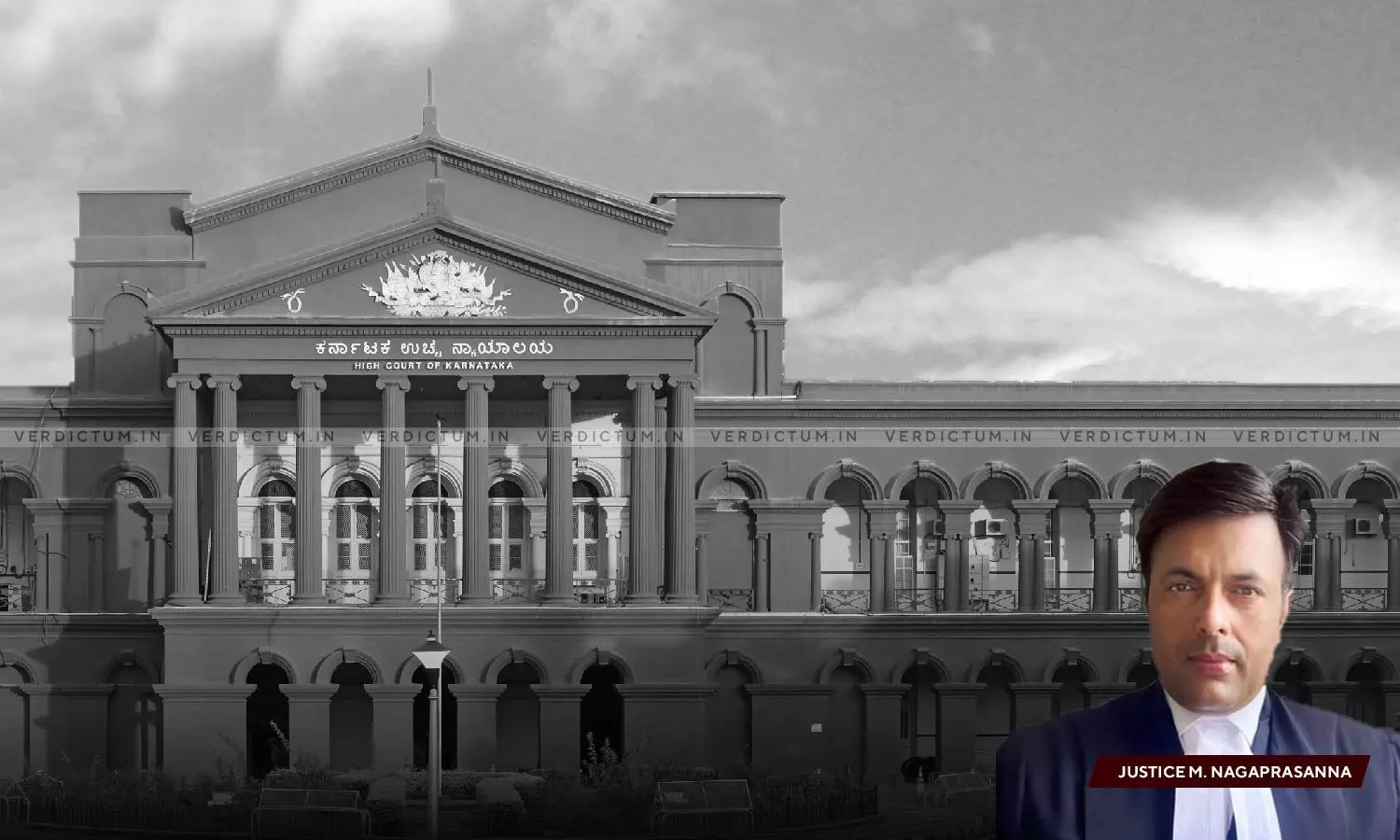
Justice M. Nagaprasanna, Karnataka High Court
Karnataka High Court Remits Back Matter Against Senior Advocate Accused Of Threatening Company’s Director To Dispossess From Leased Premises
 |
|The Karnataka High Court was hearing two Petitions against the registration of a crime for the offence under Section 500 IPC and the pending proceedings.
The Karnataka High Court has remitted back the matter to the Magistrate in a case against a Senior Advocate who was accused of threatening a director of a Company to dispossess from the leased premises.
The Court was hearing a batch of two Petitions challenging the registration of a crime for the offence punishable under Section 500 of the Indian Penal Code, 1860 (IPC) and the pending proceedings.
A Single Bench of Justice M. Nagaprasanna directed, “… without going into the fact whether the complaint, the sworn statement or the order of taking cognizance meeting the ingredients of the offence, I deem it appropriate to remit the matter back to the hands of the learned Magistrate to redo the process of considering the protest petition, to pass an order on the ‘B’ report and protest petition in consonance with the judgment rendered in the case of RAVIKUMAR supra.”
Senior Advocate Prabhuling K. Navadgi appeared for the Petitioners while Additional State Public Prosecutor (Addl. SPP) B.N. Jagadeesh and Advocate S. Subrahmanya appeared for the Respondent.
Brief Facts
The 2nd Petitioner was a designated Senior Advocate namely G. Venkatesh Rao, practicing before the Supreme Court and the 1st Petitioner was his wife namely Padma Malini G. Rao. The two after marriage relocated to New Delhi and the wife was the absolute owner of a property in Bangalore. The Complainant was a businessman and one of the Directors of a company being in the business of manufacture of modular kitchens. In 1994, the ground and the first floor of the said property was leased in favour of the Complainant’s company. 5 years thereafter i.e., in 1999, the husband (Senior Advocate) caused a legal notice upon the Complainant indicating that the Joint Directorate of Revenue Intelligence (DRI) – Customs Income Tax raid took place in the premises that was owned by his wife and leased out to the Complainant. In the legal notice it was directed that the company should vacate the premises since the lease deed had expired in 1998, while so saying, it was also observed that the alleged illegal activities had prompted raids by the Income Tax and the DRI. Thereafter, the building had been brought to disrepute.
The Complainant then filed a Suit for injunction to restrain the Petitioners/accused from evicting him from the leased premises. It was also alleged by the Complainant that the Senior Advocate along with 6 goondas came into the premises and allegedly assaulted the office boy and trespassed. In 2013, 14 years after the legal notice so caused, the Complainant registered a private complaint invoking Section 200 of the Criminal Procedure Code, 1973 (CrPC) alleging that the legal notice so caused was defamatory. In 2017, the Magistrate passed an Order that process cannot be issued without recording the sworn statement of the Complainant. The matter was then posted for recording of the same and the Complainant remained absent throughout. In 2023, the sworn statement was recorded after 10 years and 7 months and in 2024, the Magistrate took cognizance of the offence punishable under Section 500 IPC and registered a case. Being aggrieved by the issuance of summons for the said offence of defamation, the Petitioners approached the High Court.
Reasoning
The High Court in view of the above facts, observed, “The act of the Magistrate appears to be that he would wait till the complainant comes and records his sworn statement, as the Court has waited for 10 long years to record a sworn statement and issue process in a seemingly frivolous case registered against the petitioners. Therefore, on all the aforesaid reasons, the order of taking of cognizance and issuance of process for the offence punishable under Section 500 of the IPC is rendered unsustainable and the unsustainability would lead to its obliteration.”
The Court said that the Petition which challenges the proceedings under Section 500 IPC is to be obliterated and the proceedings regarding the threatening allegations against the Senior Advocate are to be remitted back to the Magistrate.
Accordingly, the High Court allowed the first Petition, partly allowed the second Petition, quashed the Order taking cognizance, and remitted the case to the Magistrate.
Cause Title- Padma Malini G. Rao & Anr. v. Ravi Kurumbaiah (Case Number: CRIMINAL PETITION No.4241 OF 2024)
Appearance:
Petitioners: Senior Advocate Prabhuling K. Navadgi and Advocate Prateek Chandramouli.
Respondent: Addl. SPP B.N. Jagadeesh and Advocate S. Subrahmanya.